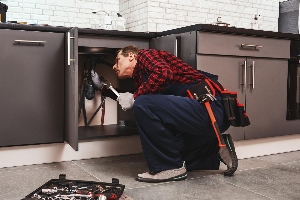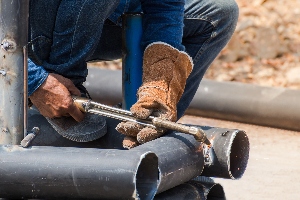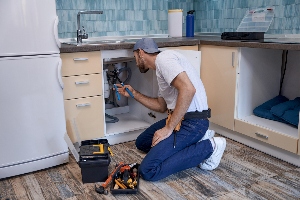A whole house water filter can significantly enhance the quality of water in your home. If you want to ensure your family has access to clean, safe drinking water, investing in a filtration system may be essential. These systems eliminate various contaminants that can affect not just your drinking water, but also the water used for cooking, bathing, and other daily activities.
Contaminants such as chlorine, lead, and sediment can compromise water quality, impacting your health and comfort. By installing a whole house water filter, you can effectively tackle these issues, ensuring that every tap in your home delivers purified water. This not only improves the taste and smell but also contributes to the longevity of your plumbing and appliances.
Considering the potential risks associated with poor water quality, it's worthwhile to evaluate the benefits of a whole house water filter for your specific situation. A thorough understanding of your water source and the contaminants present can help you make an informed decision about whether this investment will improve your household's water quality.
Understanding Water Contaminants
Water may contain various contaminants that can affect its safety and quality. Familiarizing yourself with these contaminants is crucial for making informed decisions about water filtration.
Chemical Contaminants in Water
Chemical contaminants can pose significant health risks. Chlorine is commonly used in municipal water supplies for disinfection but can form harmful byproducts, such as trihalomethanes, when it reacts with organic matter.
Heavy metals, including lead, often originate from pipes and plumbing fixtures, potentially leading to serious health issues. Pesticides and herbicides from agricultural runoff can contaminate groundwater, while organic compounds may come from industrial discharges and oil spills.
Hard water, primarily composed of minerals like calcium and magnesium, can lead to the buildup of scale in pipes and appliances. It is essential to understand the specific chemical contaminants in your water supply to assess potential health risks accurately.
Physical and Biological Contaminants
Physical contaminants, such as sediment, can impact water clarity and taste. Sediment often consists of soil, sand, and clay, which can enter the water supply due to erosion or construction activities.
Biological contaminants include bacteria, viruses, and other pathogens. For instance, coliform bacteria can indicate the presence of harmful microorganisms. Waterborne viruses can cause serious illnesses, making detection vital.
Regular testing can help identify these contaminants, ensuring the safety of your water. Knowing what threatens your water quality allows you to choose appropriate filtration methods effectively.
Benefits of Whole House Water Filtration
Installing a whole house water filter brings multiple advantages that improve your overall water experience. This system not only enhances water quality but also protects your plumbing and appliances while providing better-tasting water.
Improved Water Quality for Health
Filtered water has a significant impact on your health. A whole house filtration system removes contaminants like chlorine, lead, and sediment from your water supply.
Access to cleaner water can help reduce skin irritations and allergies. Using filtered water for bathing and drinking can lead to healthier skin and hair by minimizing exposure to harsh chemicals.
Benefits to consider:
- Reduces exposure to harmful substances
- Enhances hydration with cleaner water
By ensuring that your entire household receives filtered water, you take a proactive step toward health and well-being.
Protection for Plumbing and Appliances
Hard water and contaminants can cause serious damage to your plumbing system and appliances. Whole house water filters help reduce scale buildup in pipes, which can lead to clogs and decreased water pressure over time.
By preventing these issues, you can extend the lifespan of your plumbing and household appliances. This includes dishwashers, washing machines, and water heaters, all of which perform better with filtered water.
Advantages of protection:
- Reduced maintenance costs
- Increased efficiency in appliance operation
- Investing in filtration safeguards your property and minimizes potential repair expenses.
Enhanced Taste and Odor Removal
Unpleasant tastes and odors in your water can deter you from drinking enough fluids. A whole house water filter effectively removes unpleasant flavors, often caused by chlorine or bacteria.
You’ll enjoy cleaner, fresher-tasting water right from the tap. This improvement in taste can encourage both you and your family to drink more water, promoting better hydration.
Key improvements:
- Better taste and smell
- Increased water consumption
- With a whole house water filter, enhancing the sensory experience of your water contributes to a healthier lifestyle.
Different Types of Whole House Water Filters
When considering a whole house water filter, it's essential to understand the various types available and their specific functions. Each system targets different contaminants and offers unique benefits for your household water needs.
Sediment Filters and Their Role
Sediment filters are designed to remove larger particles from your water supply. They can capture sediment, dirt, sand, and rust, which can accumulate in your plumbing.
These filters function through a series of screens or membranes that block unwanted particles while allowing water to pass. Keeping sediment out of your water system helps prevent clogs in pipes and appliances.
Using sediment filters prolongs the lifespan of other filtration systems by reducing the burden of larger particles. They are often the first line of defense in a comprehensive whole house system.
Carbon Filter Systems
Carbon filter systems effectively reduce volatile organic compounds (VOCs) and chlorine from your water. These systems use activated carbon to absorb impurities, resulting in cleaner tasting and healthier water.
The effectiveness of carbon filters depends on water flow rates and the amount of activated carbon in the system. They can also remove odors and improve the overall quality of your water.
Regular maintenance is crucial, as carbon filters require replacement to maintain their efficiency. Installing a carbon filter system is a popular choice for improving drinking water quality.
Reverse Osmosis Systems
Reverse osmosis (RO) systems are highly effective at removing a wide range of contaminants, including heavy metals, salts, and microscopic pathogens.
The process involves forcing water through a semipermeable membrane, allowing only pure water to pass through while trapping larger molecules. This option is particularly beneficial if you have concerns about water contamination or mineral buildup.
RO systems can also come with additional filtration components, enhancing their effectiveness. Depending on your specific needs, this system could be installed for the entire house or just for drinking water at designated points.
Ion Exchange Filters for Water Softening
Ion exchange filters are especially useful in combating hard water issues. They work by exchanging calcium and magnesium ions, which cause water hardness, with sodium ions.
This process significantly reduces scale buildup in pipes and appliances, leading to improved performance and longevity. You may notice benefits such as softer skin and hair after showering, along with better detergent efficiency in laundry.
While ion exchange systems focus primarily on water softening, they can also provide some level of filtration. Regular maintenance and salt replenishment are key to keeping these systems running effectively.
UV Light Purification Options
Ultraviolet (UV) light purification is a chemical-free method to eliminate bacteria, viruses, and pathogens in water. UV systems expose water to ultraviolet light, disrupting the DNA of harmful microorganisms.
This method is effective for disinfection and can be used alongside other filtration methods to enhance overall water safety. UV systems do not affect the taste or odor of water, as they don’t introduce any chemicals.
They require minimal maintenance, but proper installation is crucial to ensure effectiveness. These systems are an excellent choice if you're concerned about microbial contaminants in your water supply.
Installation and Maintenance of Whole House Water Filters
Installing and maintaining a whole house water filter requires careful planning and regular upkeep to ensure optimal performance. Understanding the key considerations and steps involved ensures your system delivers clean water effectively.
Considerations Before Installation
Before installation, evaluate your home’s water quality and your specific filtration needs. You should test your water for contaminants, such as chlorine, lead, and sediment. Knowing the types of impurities present will help determine which filtration system is right for you.
Also, assess the lifespan of the filter you choose. Some systems have longer replacement intervals but may require more expensive filters. Ensure your installation area has adequate space, including access for maintenance.
Steps of Professional Installation
A professional installation typically begins with an assessment of your existing plumbing system. Our professional plumbers will identify the optimal location for the filter, typically near the main water line.
They will then shut off the main water supply and drain the system before installing the appropriate filter and making any necessary modifications to the plumbing. It's essential to work with our qualified plumbers to ensure proper setup, as improper installation can lead to leaks or reduced efficiency.
Once the installation is complete, our plumbers will run thorough tests to ensure everything is functioning correctly. They will also provide detailed information on the filter type and maintenance requirements to maximize its longevity.
Maintenance Schedule and Tips
Regular maintenance extends the life of your whole house water filter and ensures optimal performance. You should establish a maintenance schedule based on the manufacturer's recommendations, which often suggest inspections every 6 to 12 months.
During maintenance, inspect all connections for leaks and ensure there is no buildup of sediment. Depending on your filtration system, you may need to flush the filter or clean any pre-filters involved.
Keep a log of maintenance activities and filter replacements to track when parts need to be changed. This proactive approach can prevent unexpected issues and save costs in the long run.
Replacing Filter Media and Components
Replacing filter media and components is crucial for maintaining efficiency. Follow the manufacturer guidelines for replacement frequency, typically ranging from every 6 months to 5 years, depending on the type of system and water usage.
When replacing filters, make sure to purchase compatible replacement filters to maintain safety and effectiveness. Filters can usually be replaced without professional help, but if you are unsure, consult with your plumber.
After replacing media, run water through the system to clear any residual particles. Regularly changing filters not only improves water quality but also prolongs the lifespan of your filtration system, ensuring each tap in your home provides clean, safe water.
Assessing Your Home's Water Filtration Needs
Assessing your home's water filtration needs involves understanding specific water quality issues, determining appropriate filter capacity, and selecting a filter based on the types of contaminants present in your water supply. Identifying these factors will help ensure clean, safe water for your household.
Evaluating Water Quality Issues
Start with a water quality test to determine the specific issues within your water supply. Depending on whether you use city or well water, your concerns may differ. Common issues include:
- Hard water: Contains high levels of minerals like calcium and magnesium, which can cause scale buildup.
- Metals: Copper, lead, or iron may leach into your water supply, often due to aging pipes.
- Microbial contaminants: Bacteria or viruses can present a risk, especially in well water.
Look for a reliable testing kit or hire a professional for a detailed analysis. The results will highlight which contaminants require filtration and will guide your choice of a water treatment system.
Determining Filter Capacity and Flow Rate
When selecting a water filter, consider its capacity and flow rate. Flow rate refers to how quickly water passes through the system, measured in gallons per minute (GPM).
- Household needs: Calculate your household's peak water usage. A family of four, for instance, typically requires a filter with a flow rate of at least 7-10 GPM for simultaneous use in bathrooms and kitchens.
- Filter capacity: Look for filters with capacities that suit your water usage over a specified time. For example, a whole-house filter should effectively handle the volume used during peak demand without sacrificing performance.
Balancing these factors is crucial for ensuring adequate water supply without delays or drop in pressure.
Choosing a Filter Based on Contaminant Type
The choice of filtration system should align with the specific contaminants identified in your water. Different filters target different issues:
- Sediment filters: Remove particulates like sand, dirt, and rust.
- Activated carbon filters: Effective against chlorine, taste, and odors, these also reduce some heavy metals.
- Reverse osmosis systems: Best for removing a wide range of contaminants, including dissolved solids and specific toxins.
Ensure the filter you select is certified for the contaminants detected during your water testing. Using the right system tailored to your needs will enhance water quality and safety in your home.
Cost Considerations for Whole House Water Filters
When considering a whole house water filter, you should evaluate both the initial investment and potential long-term savings. Additionally, comparing prices and features across different brands will help you make an informed choice. Understanding how these systems may influence your utility bills is also essential.
Initial Investment and Long-Term Savings
The initial cost of whole house water filters typically ranges from $1,000 to $4,000. Prices vary based on the system type, capacity, and filtration technology used. For instance, advanced filtration systems such as reverse osmosis or those that include a water softener may be more expensive upfront.
Despite the high initial costs, these systems offer long-term savings. You can see a reduction in bottled water purchases and a decrease in plumbing repairs from cleaner water. Well-maintained filters can also extend the lifespan of appliances, further maximizing your investment.
Our Whole House Water Filter service provides comprehensive filtration solutions that ensure every tap in your home delivers pure, clean water. We install top-of-the-line filtration systems that remove contaminants, improve taste, and protect against plumbing corrosion, enhancing your overall water quality and health.
Contact us (864) 663-2255 today!












